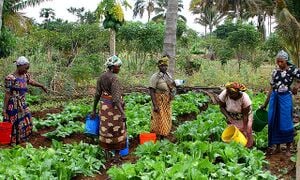This page is the beginnings of a portal for Africa community action in response to Ecological emergency. The majority of our information about this is collated and can be shared via our place pages...Near you.

 Green Congo Initiative: a Youth Engagement for the Climate in the Heart of Africa, happyeconews.com (Apr 28, 2023)
Green Congo Initiative: a Youth Engagement for the Climate in the Heart of Africa, happyeconews.com (Apr 28, 2023)
Biodiversity[edit | edit source]
- Serengeti Watch, link checked 15:17, 25 November 2021 (UTC)
Peace Parks Foundation[edit | edit source]
The Peace Park Foundation, founded in 1997 by Dr Anton Rupert, President Nelson Mandela and Prince Bernhard of the Netherlands, is an organisation that aims to re-establish, renew and conserve large ecosystems in Africa, transcending man-made boundaries by creating regionally integrated and sustainably managed networks of Transfrontier Conservation Areas (TFCAs). Peace Parks Foundation has been involved in the establishment and development of ten of the 18 TFCAs found throughout southern Africa, all of which are in various stages of development. The establishment of each TFCA, or peace park, is complex and far-reaching, and involves several phases of activity, which can take many years to achieve.
Open spaces[edit | edit source]
- African Parks, non-profit conservation organisation that takes on the complete responsibility for the rehabilitation and long-term management of national parks in partnership with governments and local communities. African Parks manages 19 national parks and protected areas in eleven countries covering over 14.7 million hectares in Angola, Benin, Central African Republic, Chad, the Democratic Republic of the Congo, the Republic of Congo, Malawi, Mozambique, Rwanda, Zambia and Zimbabwe.[1] W
Africa has over 3,000 protected areas, with 198 marine protected areas, 50 biosphere reserves, and 80 wetlands reserves. Significant habitat destruction, increases in human population and poaching are reducing Africa's biological diversity and arable land. Human encroachment, civil unrest and the introduction of non-native species threaten biodiversity in Africa. This has been exacerbated by administrative problems, inadequate personnel and funding problems.
Trees, woodland and forest[edit | edit source]
Great Green Wall[edit | edit source]
The Great Green Wall or Great Green Wall of the Sahara and the Sahel (French: Grande Muraille Verte pour le Sahara et le Sahel) is a project led by the African Union, initially conceived as a way to combat desertification in the Sahel region and hold back expansion of the Sahara, by planting a wall of trees stretching across the entire Sahel. The modern green wall has since evolved into a program promoting water harvesting techniques, greenery protection and improving indigenous land use techniques, aimed at creating a mosaic of green and productive landscapes across North Africa.
The project is a response to the combined effect of natural resources degradation and drought in rural areas. It seeks to help communities mitigate and adapt to climate change as well as improve food security. The population of the Sahel is expected to double by 2039, emphasizing the importance of maintaining food production and environmental protection in the area. W
FAO page on the Great Green Wall
News and comment
 The "Great Green Wall" of the Sahel, promising to halt the Sahara's advance, inspires both science and arts, The Alternative UK (Feb 20, 2022)
The "Great Green Wall" of the Sahel, promising to halt the Sahara's advance, inspires both science and arts, The Alternative UK (Feb 20, 2022)
Other intitiatives[edit | edit source]
Greenpop, social enterprise that runs urban greening and reforestation projects in sub-Saharan Africa.
Deforestation in Africa[edit | edit source]
Africa is suffering deforestation at twice the world rate, according to the United Nations Environment Programme (UNEP). Some sources claim that deforestation has already wiped out roughly 90% of West Africa's original forests. Deforestation is accelerating in Central Africa. According to the FAO, Africa lost the highest percentage of tropical forests of any continent during the 1980s, 1990s, and early 2000s. According to the figures from the FAO (1997), only 22.8% of West Africa's moist forests remain, much of this degraded. Nigeria has lost 81% of its old-growth forests in just 15 years (1990–2005). Massive deforestation threatens food security in some African countries. One factor contributing to the continent's high rates of deforestation is the dependence of 90% of its population on wood as fuel for heating and cooking.
Research carried out by WWF International in 2006 shows that in Africa, rates of illegal logging vary from 50% in Cameroon and Equatorial Guinea to 70% in Gabon and 80% in Liberia – where timber revenues played a major role in financing the Sierra Leone Civil War and other regional armed conflicts until the UN Security Council imposed a ban on all Liberian timber in 2003. W
News and comment[edit | edit source]
2022
 Elephants on the Move: 250 Elephants to be Relocated in Malawi, African Parks (Jun 21, 2022)
Elephants on the Move: 250 Elephants to be Relocated in Malawi, African Parks (Jun 21, 2022)
2021
How elephants help pump planet-warming carbon underground, Nov 18...[2]Climate change solutions news
See also[edit | edit source]
References
- ↑ africanparks.org, press release
- ↑ theconversation.com

